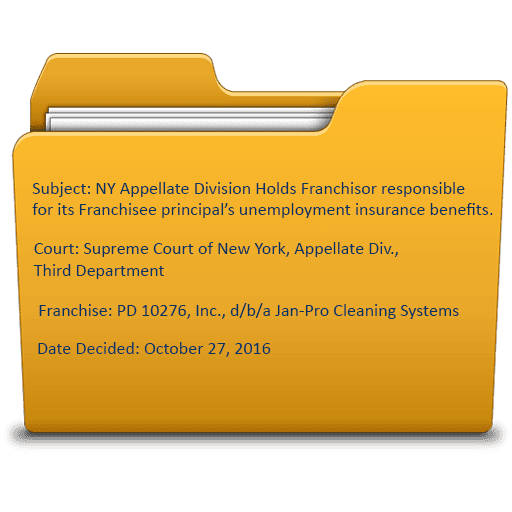 This is a troubling decision for Franchisors in New York State.
This is a troubling decision for Franchisors in New York State.
The Franchisee, Mr. Baez, had entered into a franchise with PD 10276, Inc. (“Jan-Pro”) Subsequent to the Franchisee ceasing operations, he applied for unemployment insurance benefits. The State Department of Labor undertook an audit and determined that Baez was an employee of Jan-Pro, and that the Franchisor owed the State $30,166.93 in insurance contributions.
On appeal, an administrative judge reversed the finding, but this decision was reversed by the Unemployment Insurance Appeal Board, finding that Baez was an employee. The Appellate Division agreed with this determination.
The Court noted the statutory definition at issue: “An employment relationship will be found when the evidence shows that the employer exercises control over the results produced or the means used to achieve the results, with control over the means [being] the more important factor” This is a fact sensitive issue. Here, the Court found substantial evidence in the record to support the Board’s decision: Jan-Pro assigned Baez a specific geographic territory and required new Franchisees to undergo initial mandatory training, which was paid for by Jan-Pro. Franchisees were also required to operate the business in accordance with the procedures established at the training and the standards set forth by Jan-Pro. To that end, Franchisees had to use Jan-Pro-sanctioned equipment, supplies, products and business forms. Jan-Pro helped resolve any complaints between a customer and a Franchisee and retained the right to discontinue a Franchisee’s services to any client any time. Jan-Pro provided Franchisees with a starter set of business cards, which contained Jan-Pro’s logo, and Baez’s business card listed Jan-Pro’s name, logo and address. Although Baez had the option of designing his own business card, any such designs required Jan-Pro’s approval. Furthermore, according to the franchise agreement, if Baez developed any new concepts or techniques that improved Jan-Pro’s business, these became Jan-Pro’s property.
What is disturbing about this decision is that the cited “substantial evidence” describes the content of most Franchise Agreements. Oddly, the Court conceded that there was evidence in the record which would have supported a contrary result, but it was not considered “substantial.”
Citation: 2016 N.Y. App. Div. LEXIS 6946
BE ADVISED that these comments are not intended as legal opinions and are not to be relied upon as legal advice. If you need legal advice, or a referral to a business consultant, please contact us to discuss the specifics of your franchise business.
© KilcommonsLaw, P.C. 2016he employees
